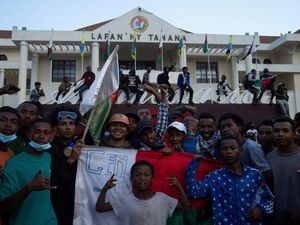India’s business landscape is changing at a pace few could have predicted a decade ago. With technology and entrepreneurship surging, the country is not just producing more billionaires, but also redefining the very nature of leadership. On August 9, 2025, two prominent voices—Sanjiv Mehta, executive chairman of L Catterton India and former managing director and CEO of Hindustan Unilever, and Puneet Chandok, president of Microsoft India and South Asia—offered their perspectives on what it takes to build sustainable, impactful businesses in this dynamic environment.
At Fortune India’s 40 Under 40 event in Mumbai, Sanjiv Mehta drew on his three-decade career in fast-moving consumer goods to share some hard-won lessons. He didn’t mince words about the unpredictable nature of business. “If you look at the word ‘crisis’ in the Chinese language, it is made out of two characters—danger and opportunity. Whenever the times were tough, we gained huge amounts of market share,” he told the audience, according to Fortune India. Mehta’s mantra? Hunt for opportunities in adversity, and you’ll come out ahead.
Mehta’s career has been marked by moments where crisis was not just a possibility, but a reality. He recounted his experience as a young member of the crisis team during the Bhopal gas tragedy—an event he described as “perhaps the world’s biggest industrial disaster.” At just 24, he was thrust into a situation involving CBI investigations, litigation in both the U.S. and India, and the daunting task of helping thousands of victims while shutting down operations. “I believe a boy became a man in Bhopal. Since then, throw me into the deep end and I will never get daunted by a crisis,” Mehta reflected.
This attitude—seeing the upside in adversity—has shaped his approach to leadership. During the Arab Spring in Egypt in the early 2010s, Mehta’s company faced chaos: police had left the barracks, and uncertainty was everywhere. Conventional wisdom would have suggested caution, but Mehta’s team did the opposite. “We doubled down on advertising because the only thing people were doing was watching television. When others shrank the distribution, we expanded it. Hunt for opportunities in adversity,” he said. The result? The company gained market share while competitors hesitated.
But for Mehta, the heart of business resilience lies with people. “The most important fundamental principle I have believed in is this: look after your people, and people will look after your business,” he stated. He shared an example from the Middle East, where, during a period of bank shutdowns, his company collected money from wholesalers and distributed it to salespeople. They even stocked grains in their Cairo factory, telling workers to collect food when needed. The response was remarkable: “Without prompting, they protected our factories from being burnt.”
Mehta’s advice to startups and established companies alike is to treat employees as family. “If you have the right intent and purpose, you’ll make it come alive. There is an unwritten covenant between employees and employers: if you look after them, they will pay you back. It’s not about contracts, it’s about basic humanity,” he explained. This people-first philosophy, he argued, is what sustains companies through thick and thin.
As for building timeless businesses, Mehta warned against straying too far from a brand’s roots, but stressed the need to adapt communication for new generations. “You may not veer away from the core of the brand, but the way you communicate and present it must resonate with the next generation of consumers. If it doesn’t, you’ll lose your sheen.” For him, timelessness is about balancing tradition with relevance—never losing sight of purpose, yet always staying attuned to changing contexts.
This year, Fortune India’s special issue on India’s Top 100 Billionaires highlights not only the country’s economic strength but also the resilience and strategic foresight of its wealth creators. The magazine notes a slight decline in the number of dollar billionaires—from 185 to 182—but a higher entry threshold for the Top 100, now at ₹24,283 crore, up from ₹22,739 crore last year. Stalwarts like Mukesh Ambani, Gautam Adani, and the Mistry family continue to lead, while new gainers such as Sunil Mittal and Kumar Mangalam Birla demonstrate the dynamism of Indian business. Behind these numbers, as Mehta’s story shows, are individuals who have weathered storms by putting people and purpose at the center of their strategies.
Meanwhile, in the realm of technology and business, Puneet Chandok, president of Microsoft India and South Asia, is championing a similar message of adaptive, people-centered leadership. In an interview with Storyboard18, Chandok shared his recommended books and mindset principles for emerging leaders navigating India’s breakneck pace of change. For Chandok, leadership is not just about external results, but also an “inner journey.” He pointed to The Nurturing Quotient as a practical guide for leading with purpose, empathy, and agility—qualities that, he believes, drive sustainable outcomes for both organizations and individuals.
Chandok’s reading list is telling. He recommends Radical Candor by Kim Scott, which emphasizes truth, transparency, and the power of constructive feedback, and Principles by Ray Dalio, which delves into decision-making grounded in clear values. These books, he says, help leaders balance the need to deliver results with the importance of cultivating trust. “The human mind is like a canvas, where each book, conversation, and experience adds new colours, textures and dimensions,” Chandok explained. This metaphor underscores his belief in continuous learning—whether through books, podcasts, or diverse conversations—as the foundation of effective leadership.
Chandok’s advice comes at a time when India’s technology sector is evolving faster than ever. He insists that leadership is a craft that must be “continuously honed.” By blending practical tools with empathy and curiosity, he argues, leaders can not only navigate disruption but also inspire and sustain those around them. “What we feed our minds shapes our thoughts, decisions and leadership style,” Chandok told Storyboard18, stressing the need for openness to new ideas and perspectives.
Both Mehta and Chandok, though coming from different industries, converge on a central truth: enduring leadership in India’s high-growth economy is less about rigid formulas and more about adaptability, empathy, and a relentless focus on people. Whether facing civil unrest in Cairo or the relentless churn of the tech sector, their stories illustrate how purposeful leadership—rooted in values, continuous learning, and care for employees—can turn even the toughest crises into opportunities for growth.
In a country where fortunes can rise and fall with dizzying speed, these leaders remind us that the most sustainable success comes not just from seizing the moment, but from nurturing the people and principles that make those moments possible.




